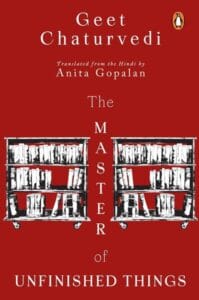“Writers on writing” is a genre in itself, one to which readers flock. However, Indian authors, especially those writing in regional Indian languages, are rarely represented in this genre meant for the internationally-acknowledged the-Western-and-the-famous. Therefore, Hindi writer Geet Chaturvedi’s The Master of Unfinished Things, translated into English by Anita Gopalan, will come as a breath of curious air.

Chaturvedi recently gained acclaim for his novel Simsim dedicated to the Sindhi experience of the Partition of India. This new slim volume has his prose in the form of essays, memoirs and diary entries. While the pieces differ in subject and theme, one trope runs through most of them: the author’s reflections on books, stories, and writing. The title of the book comes from the essay of the same name and relates to the fact that writers have many “projects” going on. One learns that one shouldn’t ask a writer what they have written, but what they have left unfinished. At least that is how Chaturvedi sees himself. The book contains more of such thoughts about how Chaturvedi writes, and the process of writing in general.
Chaturvedi is no exception to the rule that writers, irrespective of language, are very well read people:
Whether I write surrounded by music or silence, amidst crowds or on a deserted island, I’ve found that such habits and indulges wear thin, like clothes worn repeatedly. Echoing the sentiments of English poet Philip Larkin in my own words, a writer isn’t like a doctor who can rely on the same treatment approach throughout their career. Instead, a writer must continually invent new methods for performing the same ‘surgery’… I don’t write swiftly or hastily. Adam Zagajeweski seems to have written these words for me: ‘I write as slowly as if I’ll live two hundred years.’
Umberto Eco, Franz Kafka, Iranian poet Sabeer Haka, and several others keep popping up in different essays, as if in a dialogue among themselves and with Chaturvedi.
Elsewhere, Chaturvedi talks about Camus’s Meursault (the protagonist in The Stranger). He recalls a moment when he was caught stealing a book and he does not show any signs of guilt:
I made no apology. It wasn’t arrogance or disrespect. Meursault completely occupied my mind—he was solemnly affirming my lack of guilt.
Discussions of Indian myths and folklore add to these literary musings. One discussion or reference relates to a myth about Goddess Parvati asking her consort Mahadeva (Lord Shiva) to narrate a story that no one has ever heard. Shiva obliges. But they are unaware that a gana (attendant) listened to the story that defined a private moment between the two divinities. The gana goes and narrates it to his wife. It turns out that the wife is in the service of the Goddess. Unwittingly, she shares the story with the Goddess, making her upset with Shiva. Chaturvedi’s point is that writers don’t or cannot write “for” a reader, and therefore, the question often posed to writers about their sense of a “target” audience does not make sense:
View Mahadeva as the author, and Parvati as the reader (listener). Mahadeva believes there is only one reader—Parvati, the intended or target audience of the story. However, in reality, there are two readers, as the unseen gana also shares in this experience. Mahadeva never envisioned him while narrating, yet, his gana finds equal delight in the tale. Upon casting a wider gaze, it emerges that there are actually three readers, as the gana’s wife also joins in, and Mahadeva is unaware of her presence as well.
Writing is “an enchanting hesitation”, Chaturvedi writes. In Chaturvedi, and in the Global South, universality gets dissolved into difference as when he writes about the politics of recognition:
Your own country does not give you recognition, insisting you first gain acclaim abroad. Foreigners deny you entry, questioning why they should heed your work when your own country hasn’t endorsed it. If homeland recognition existed, gaining entry elsewhere might be easier.
From the origin of stories to their destination; from stealing books to identifying with literary characters; from specific authors to a sort of mythical, if not universal, writing unconscious that writers partake of when discussing their art, Chaturvedi’s musings add an Indian touch to the conversations about philosophy of writing.


You must be logged in to post a comment.